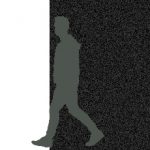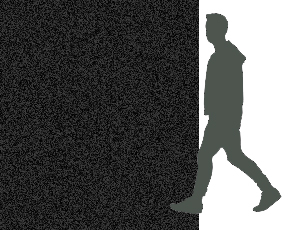The Poet said: “Yes, yes,
I am. A Poet am.
The Guess has long been cramm’d
on my soul, and only
recently have I took
my spine—bonely like books’
all along—and stood up
straight—on my eyes, mouth—
like pups born north, raised south.
I have a… a vision.”
And with this, what follows,
he did begin to close
the distance of his walk:
to set his feet boldly,
like talkless and oldly
general takes proud steps
out to a firing squad,
having been prep’d to God—
a firing squad composed
of his own trained soldiers:
those most like sons, brothers—
to be shot for treason—
and he stares resolute
and on a pin turns boot
to face the squad, salute—
except the Poet talked.
Back shooted straight as stalk,
he spoke with an eye-glaze,
a glaze which coated words
like clay: heat haze re-ferred
and re-fired that clay hard,
making his words like stone,
like shards of the first moan
from modern vocal chords,
refined by pure language;
and his arms soared with pidg’
loftiness—like, before
touching the brush to it,
how pour and let them flit
the hands of a painter
move when that painter sees
where they’ll daint or trapeze
over a large mural,
a wall now, but if hands
could fill, then… or a band’s
conductor—orchestra’s,
rather—after tapping
the stand, ‘fore the snapping
begins of the music:
how that conductor will
spread thickly, grandly fill
the instruments’ players
with sound’s sound. So he said:
“All my sayers in bed
lie. But I’ve a vision.
I feel it inside me.
And whin I can set free
it, it will pour forth from
these hands, this mouth, this… this”
(though in the dumb spot his
hand touched his chest, said:) “mind.
It will captivate-free
all signs, all apathy
to print and thought and soul.
It will let loose, explode,
make the parts holes and snowed-
in lodgers love the cold.
I just have to find words,
a bold language, the curds
of the hearts.” The drops stuck
to the grass, fell soundly
from the trees, tucked boundly
inside cracks and caverns
of branches, released by
the turning sun’s slow fly.
“Embrace all humankind
if one is—be—oneself.
The mind will put on shelf
all vision if visions
are limited to mirrors.
In end, to win, to fear
this self-simulation
behavior, is to walk:
the sin ’tis not to talk,
nor not to not to talk,
but to be closed to talk:
to break the chalk, to caulk—”
This drop-filled dramatic monologue
has long been held captive in my brain:
poetic uncloggers add more stains,
require chores
to unwork—
or, new work:
The Fairly Tragic Ballad of Flailin’ McDrab
by Matthew Todd Greenfield

Chapter 22
And then the world ended.
Flailin’ McDrab stood there,
mended memory tear’d.
Couldn’t tell: was this that same,
that original house?
Something unnam’d, like mouse
steps, kept soft scurrying—
something was different,
some thing with his mind’s bent,
his mem’ry, or the house,
the town, the whole city
itself—the blouse fit he
a bit too tightly, now.
And then the world ended.
Like “Pow!” all was lended
where once all had been loaned.
Suddenly, without one
explosion’s moan or gun’s
pop, it was Flailin’,
ev’ryone else dreaming:
palin’, their dreams’ seeming
of a White Christmas—tune
that echoed hauntingly
in the un-moon’s tingly
shade of off-white—any
and everywhere hue;
many now just a few—
now one, in fact: F.M.
He was there, there outside,
house in front him—now, wide…
wide. All so fast, a sound
like a book’s swift shutting:
world, ground, now abutting
nothing, not e’en nothing.
To Flailin’ McDrab, whole
the ev’rything—when stole
he away from that house
all the way up to ’til
the mouse-scurrying tilled
his brain soil when he stood
just now—all those events,
the happy-good that tents
him, all of that seeming
like the may-have-happened:
dreaming, not quite, but bend
in one’s mind almost such.
As like being alone
in one’s room, much unknown,
and someone suddenly
op’ning the door, peeking
to see, and, not seeking
long conversations, says
something and then just leaves.
And you are belezzled. Leave?
Right after the leaving,
when there’s only silence
sieving, only that, since
s/he closed the door, the wind
of the door closing’s what
doesn’t rescind the, “But,
it’s my imag’nation”
thought. Then there is no wind.
Stationed nothing is, kin
nor kith. That’s what was like,
the right after: how it seemed,
how all seemed. Like a seam
of a room, reaching one,
after running fast through
a ton of rooms—the loo,
den, et.—in a many-
roomed house, then sudden stop.
Stop in Lenny’s (or, drop
some other fake name here)’s
room and, not noticing
how there you got, missing
the view of other rooms
because were running so.
Or through the looms of flow-
air you see a seagull
against pure white clouds, which
the dull bird, without hitch,
suddenly turns its wings
and blends into, supposed
disappearing. Or those
crows against the black night:
same thing. Or a whole flock
and flight of birds: unlock’d
for a moment, unpacked
in the sky, then sudden
together back, hudd’ in
and one large bulgy mass.
Or you’re riding on bike,
and “gas” give it to hike
uphill, and sudden look
up, through the trees (zooming
downhill now, looking): fling’d
there is the sky through aisle
of leaves, and it zooms through
the pile of trees to you,
like it’s going to fall.
Breaking bread with the earth,
that too here calls forth: girth
of dirt and soil, but all
jumps with life… in the ground.
Or tall crowds, gathered ’round
to view a big parade:
folks of all diff’rent sorts,
in front them made a sport
to view, a spectacle
files past (a white el’phant,
say), fill’d there, in-a-mint
money waiting to spend,
all focused on the it,
the they forfended, sits
still until, suddenly,
all collectively see
that free they must all be,
and so separated
to type: by look, think, have.
Not even said, just half-
thought this recognition:
a split-second moment’s
‘nition—before all wents,
when all there see themselves,
and take some pride, give joy,
before to shelves the toys
are arranged—just then, that’s
what it was like, when that
non-fat milk’s full of fat,
with wholly whole wholeness,
silliness beautiful,
where the thoughts’ jests’ void’s null,
before the disrupted flow,
‘fore divers’ty’s bended.
And so the world ended.
And there, there there against
the neither white-nor-black
blank with no rents, no lack,
there stood—floated?—non-stood
there which was the only
for-good there: not lonely,
not sad, not distraughtful,
not mad, not disdainful, not
bad, not awful, not shot-
by-his-own-thoughts depressed,
just there, as happiness
caressed (as always, best),
like one on his or her
twenty-second birthday,
who has cured the way
and now stands highly high
on the precipiceness
of nigh near the whole bless’d
life before you, waiting,
ready, willing to jump,
satiating the pump
of the push to ready-
ready-ready-go—held
steady, perhaps not; fell’d
some, perhaps a li’l bit;
but now is the nowness,
and there it sits; nessness
what it/you will, your name
fits the bill, giant-size—
the same, just the same, priz’d
Flailin’ McDrab was there.
Flai’ tried to move, explore;
though he mov’d, hair’s-breadth floor-
lengths he did not transport
himself. All his movements
retorted with silence,
and, though exaggerate
they were ‘gainst the background,
there still did sit, no ground
nor anything touch’d upon.
So, he lived, smiled, and laughed.
Though gone all fore and aft,
all bridges high and low,
the source of happy his
was still there known—ne’er miss
could himself. So, like he
lived happily ever
fore-be, he now never
but lives happily e’er
after… He now thought back
on all the Karens, Jacks,
and So-Forths that he’s known
(and we’ve known them too):
the grown and the grown-through
has he passed while walking.
And thought he—Flai’—then this:
though they’re talking things, miss’d
have they most profoundly
many true-‘portant things,
soundly plain to F.; zings
by, past, and through these things
to all others. Not e’en
if things could sing, unweaned
they all would be e’er still.
One thing: his happiness.
So fill’d his mind this guess
in the blank: he, Flailin’,
lives a life of the mind—
not as’f jailin’, but sign’d
off to be free: it could
be, if could be could be.
He would that all could see
how he—but all they see—
would/will(/should?) ever see
are footnotes, just the
references to the main
text that is his life: through
what’s stained there, margin-view’d,
maybe they could inkling-
follow his narr’tive, but know
as he knows?—thing unknown.
And he’s happy—happy
in that, as in all else.
Sappy in his joy, he felt
as always forever.
He touch’d face unshaven,
the beard slow stirring, then
naturally put his hands
inside his pockets two.
As land’d right there, he new-
touch’d and slow removed
the pen from inside one;
then both hands moved o’er sun-
colored small inscription.
Flailin’ look’d at his face
pinch’d in the bright gold place—
reflection in pen top.
Then twist’d pen, look’d at point.
Flai’ didn’t drop the joint
art’ficial, but in hand held aloft,
look’d it from afar; said something ends
“áh”—though not said soft—don’t know—how end
it—because:
Was it “Nah”?
Was it “Yeah”?

The End?*
*In the wake of the “Concordia Event” (or “CE,” as it has come to be known by literary archaeologists) a long and pristinely-edited manuscript was discovered, in the vicinity of what once had been Concordia, of dubious authorship and provenance. While some claim that it represents the post-CE masterpiece of the “Flailin’ McDrab” personage described above, others posit that it is actually the work of Flailin’s Creator, or the “Ur-Flailin'” of myth, from a dimension beyond the eleven currently known to humankind. Regardless—merely as footnote to this bizarre 2004-2005 era in history—the editors-that-be felt it to be most just and fitting to publish this chronicle as well, dated to approximately 10 years post-CE (or the palindromic 5775 of the Elders’ Calendar, well noted for its recursive miracles):
